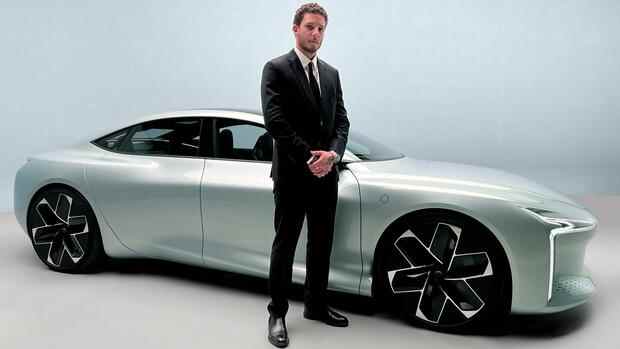The ex-racing driver is trying to achieve what Tesla has been able to do with electromobility in recent years.
(Photo: Hopium)
Paris A decade ago, Olivier Lombard showed up for work in a body suit covered in sponsor names. The Frenchman started in junior series in motorsport, he also took part in the 24-hour race of Le Mans. But it wasn’t enough for the premier class of Formula 1.
The 31-year-old now wears a suit and tie. He is sitting in a posh Parisian hotel and is talking about the “Machina”, a luxury car with a hydrogen drive. His new goal sounds even more daring than the earlier dream of Formula 1: With his start-up Hopium, founded in 2019, Lombard hopes to achieve what Tesla has achieved in recent years with electromobility.
“We will be the first to market with a product in the high-end segment when it comes to hydrogen propulsion,” says Lombard. As potential buyers, he sees “drivers who are enthusiastic about technology” who “are not necessarily convinced that electric mobility is the only environmentally friendly solution”. Then, he believes, the technology can be “democratized” with more affordable models.
On paper, the plan is actually a bit reminiscent of Tesla’s strategy, but the comparison is very daring. The market value of the American company is almost 800 billion dollars. Last year, the e-car manufacturer delivered almost a million vehicles.
Top jobs of the day
Find the best jobs now and
be notified by email.
Series production of the Machina is scheduled to start in 2025
Hopium, on the other hand, is still in its infancy: a year ago, the start-up presented a prototype, and a concept vehicle is to be unveiled at the Paris Motor Show in October. Series production is then scheduled to start in 2025.
A few days ago, Hopium announced that it had filed its first ten patents for a “new generation of hydrogen cars”. The chances of success are uncertain. When it comes to alternatives to the combustion engine, the trend is clearly towards electric cars, while the potential for hydrogen-powered fuel cells is seen more in the commercial vehicle sector.
In his homeland, Lombard is already referred to as the “French Elon Musk”. The young entrepreneur says that he is not looking for this comparison. “Everyone has to write their own story.” But when he talks about Musk’s “phenomenal success” and “courage” to transform the auto industry, it sounds a lot like he sees the Tesla founder as a great role model.
Lombard came into contact with the hydrogen drive through motorsport, for several years he tested racing cars with fuel cells. In doing so, he learned a lot about the technology, says the Frenchman. “That enables me to at least set the broad lines for technical development.”
Expertise from ex-employees of Porsche & Tesla
Lombard does not have a technical education or an engineering degree. At Hopium, however, he has gathered around 130 experts with experience in the automotive sector and in the development of hydrogen drives. Félix Godard, who previously worked for Porsche and Tesla, is responsible for the design.
Part of the development team is based in Munich. “The presence in Germany is important for us, precisely because there is a strong tradition in the luxury segment,” says Lombard. However, he wants to set up the first production facility in France, and negotiations are currently underway about the exact location.
The start-up is reticent about the technical details of the “Machina”. The company specifies the power as 500 hp, the vehicle should be able to drive up to 230 kilometers per hour. The refueling time will be three minutes, one filling will be enough for 1000 kilometers.
Think about e-cars: charge for a range of 1000 kilometers in three minutes
Lombard says that the electric vehicles, with their long charging times and limited range, are clearly superior here. “I believe that hydrogen and electric cars will coexist for a while.” In the long term, however, the fuel cell will prevail as a climate-friendly drive.
Hopium has gained well-known cooperation partners such as the tire manufacturer Bridgestone and the French automotive supplier Plastic Omnium. Experienced managers sit on the company’s board of directors. The head of the body is Jean-Baptiste Djebbari, who was previously transport minister in the government of President Emmanuel Macron.
With its hydrogen optimism, Lombard is in the minority in the industry. Most car manufacturers rely on electromobility: Cars with fuel cells are considered too expensive and less efficient when it comes to energy use. In addition, the infrastructure for hydrogen production and the filling station network is underdeveloped.
Hopium has its sights set on the European market
Exceptions are Japan and South Korea, where hydrogen cars are particularly subsidized by the state. Hopium, however, has its sights set primarily on the European market – and there, politicians have so far given priority to electric cars. But Lombard is convinced that this will change as fuel cell technology matures.
“Governments in Europe will increasingly support the development of hydrogen mobility,” he says. There are already many projects, and the expansion of the infrastructure will follow. “Ten years ago there were hardly any charging stations for electric cars.”
Hopium’s sales targets still seem pretty modest compared to its big ambitions. In the first year, the start-up wants to sell 2,000 cars, and in 2030 it should be 8,000 cars. According to the company, 1,000 pre-orders have been received so far. The starting price for the “Machina”: 120,000 euros.
More: BMW relies on the fuel cell – almost all other car manufacturers sort them out
